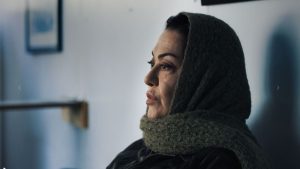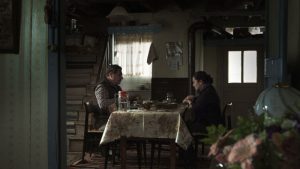QUICK AND DIRTY: LIVE FROM VENICE
Director Nehir Tuna’s feature debut, Dormitory, opens in 1996, when tensions between religious and secular Turks were mounting. In the midst of the religious and political friction, fourteen-year-old Ahmet (Doğa Karakaş) has been sent by his father to a Yurt, to learn traditional Muslim values. Unbeknownst to his father (Tansu Biçer), Ahmet sneaks out to attend a secular school, a secret he guards from almost everyone. He even lies to the school bus driver, who drops him off outside a house where he pretends to live. From there, he discreetly returns to his dormitory at the Yurt, negotiating his place between two worlds.
Going into Dormitory, I wasn’t expecting to be skipping, singing and dancing afterwards, like I would if I’d watched Singin’ in the Rain (Gene Kelly/ Stanley Donen, 1952). Nor did I want to. Dormitory’s appeal was that it would plough through the depths of oppressive anxiety, and explore how youth is a precarious, and potentially traumatising period in a person’s life. It’s a film that adequately meets these expectations, and without cynicism surrenders itself to the realisation that life is to be survived, and sometimes we have to either accept, or if we’re lucky, choose the hell we’re living.
This is an idea expressed by Ahmet’s only friend in the Yurt, Hakan (Can Bartu Arslan), who accepts that this might be the best place for him. With street smarts the wealthier Ahmet lacks, there’s a class interplay between the pair, that Tuna suggests more than he acts upon. Throughout the story, it’s a silent antagonist, stalking, waiting until it’s time to strike.
While I’ve offered a dark and oppressive appraisal thus far, Tuna’s film is not without joyous, rebellious and humorous moment, but the objective of this type of story is to oppress the audience with heavier emotions and themes. Despite moments of relief, Dormitory honours the anxiety and pain of one teenager’s yearning. It opens with a catchy albeit intrusive score, that, alongside the text that establishes the political and religious context, sounds an ominous warning of the dramatic storm that’s to come.
Tuna draws on personal experience, who, as a child, spent five years in what he describes as a “religious dormitory”, and this is likely why, throughout the story, we keenly feel the pressure Ahmet experiences. There’s a notable duality that contributes to his internalised and externalised pressure. While he wants to escape the Yurt, he tries to belong, maybe in part to placate his parents, and partly driven by the instinct to find communal belonging, even if it means compromising his identity and values.
Meanwhile, in the secular school, a potential romantic interest, Sevinç (Işıltı Su Alyanak), asserts how unsettling it is to think there’s a student amongst them who lives in a Yurt. The harsh nature of these words is added to by the affection the pair share – swapping presents, walking and talking in the school yard. Dormitory touches upon the idea of conformity, but also the complications in a fractured and adversarial society, where prejudicial hostility is rife.
Ahmet is the archetypal outsider, caught between two worlds – we must consider the question whether he can truly belong to either side, or must he walk his own path? The monochrome cinematography accentuates his experience of being caught in the shadows of religious and secular Turkey. It’s not merely an aesthetic choice, but one that connects with the substance of the story, which appears to be about Ahmet, but is it? The story may be as much about his father, who represents the insecurities and regrets of one generation that shapes the experiences of another generation. As his father says to him, “You are my redemption, my salvation.”
Dormitory is an incisive reflection on generational relationships, and despite being rich in themes and ideas, maybe Tuna missed an opportunity to explore these more thoroughly. However, I’d suggest Dormitory should be appreciated in an experiential context. The director, who is drawing off personal experiences, invites us into Ahmet’s space, to witness and experience the tumultuous society of mid-90s Turkey.
Instead of building a rigorous conversation around themes and ideas, it’s an experiential film. It lets us bear witness to an intimate yearning and anguish, but its strength is to avoid making any critical statements or answering any questions. Instead, Tuna prefers to leave his audience to resolve their feelings about the experience they’ve been privy to.
Dormitory has just had its World Premiere in the Orizzonti section of the 2023 Venice Film Festival.











